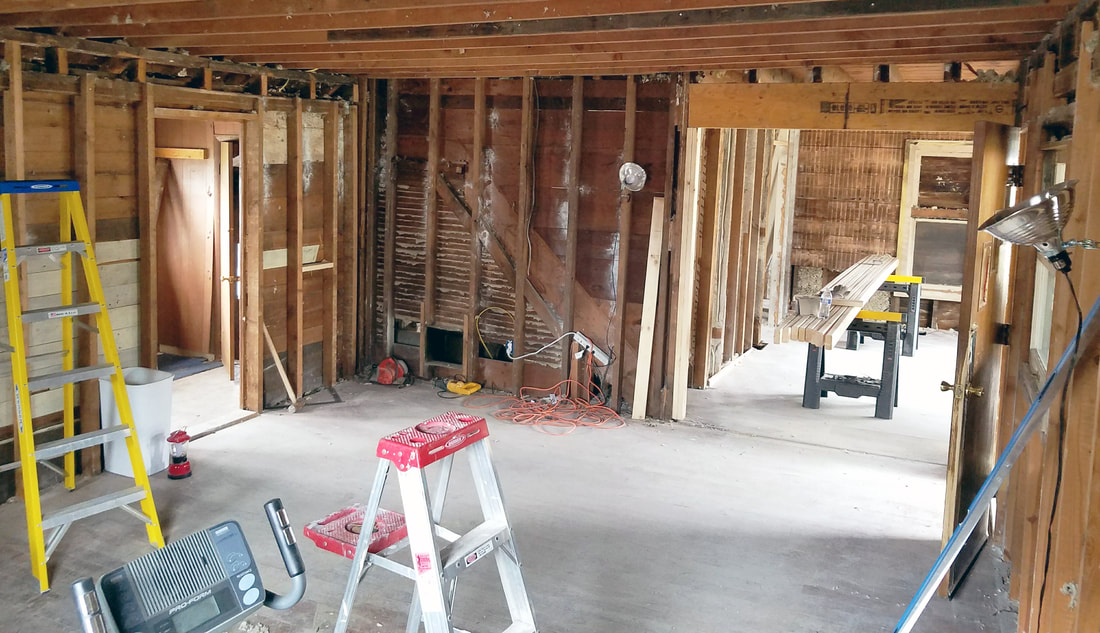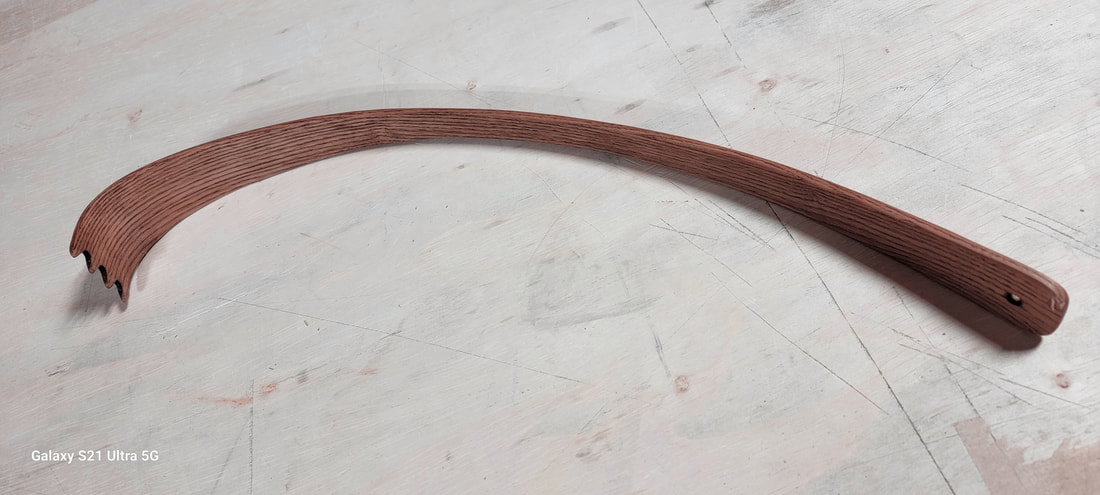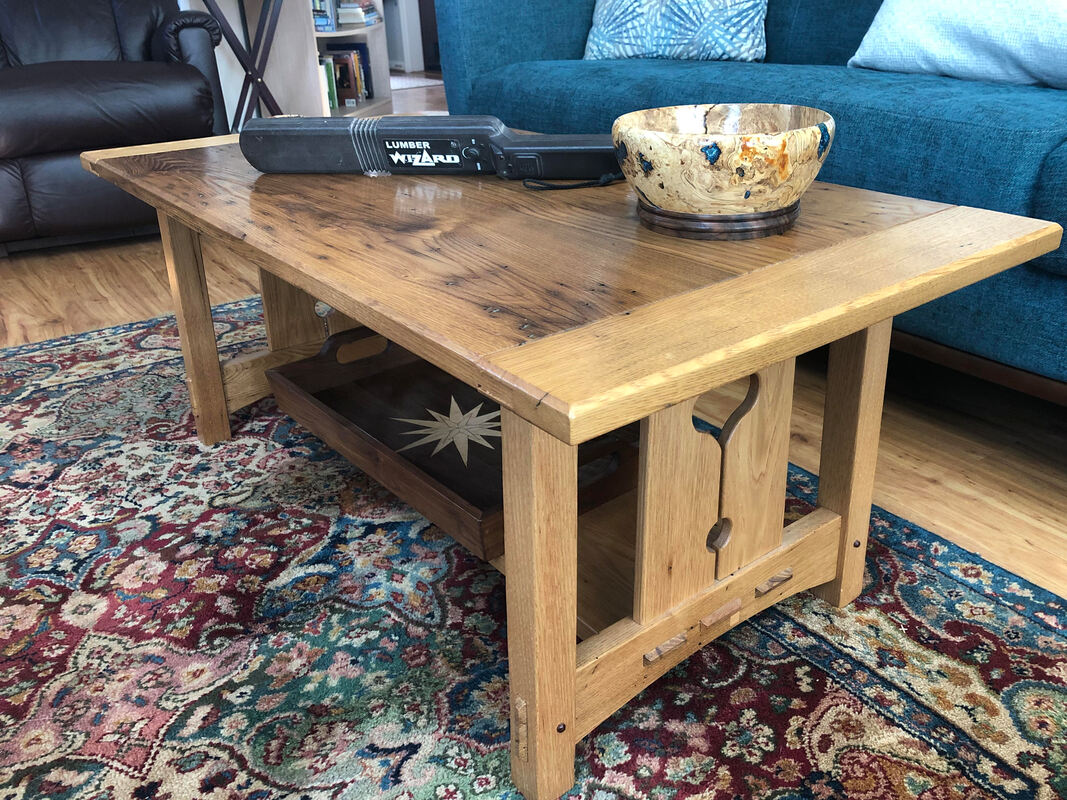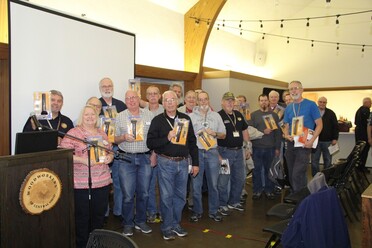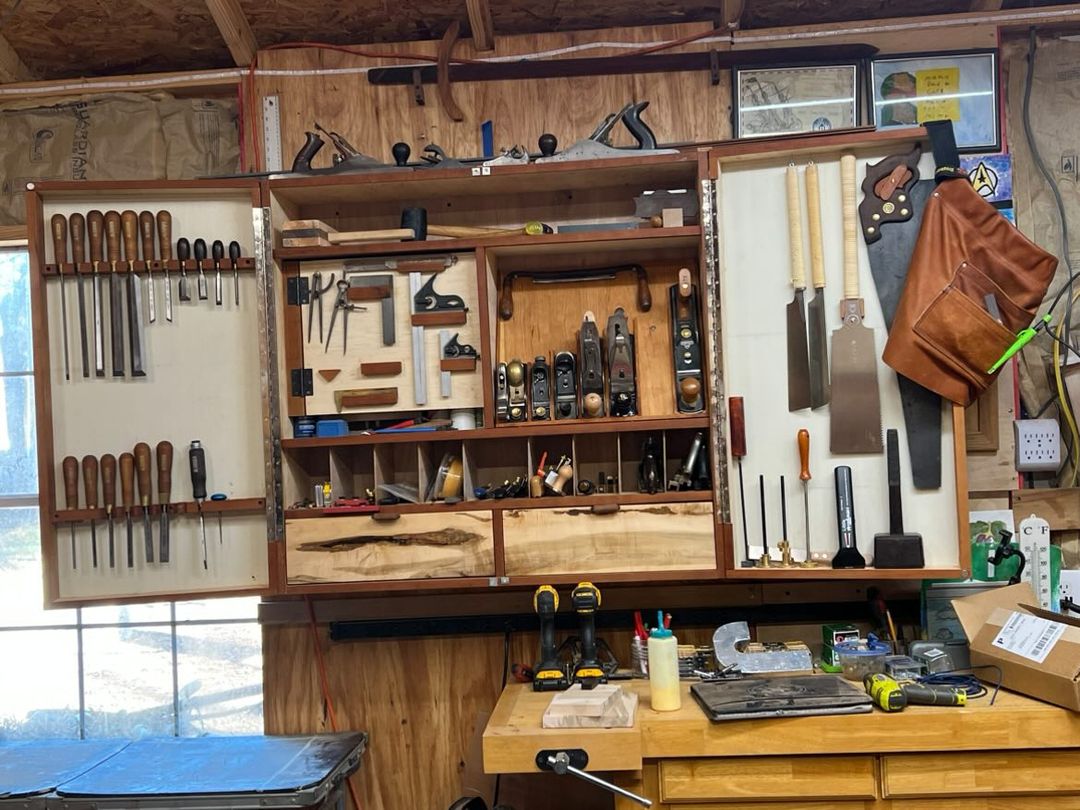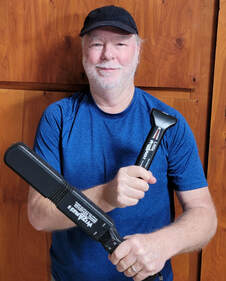 Woodworking and metal detection may seem like two entirely different fields, but they intersect in various ways, primarily concerning safety, tool maintenance, and material reclamation. Combining these two disciplines has led to numerous benefits for the woodworking industry. The convergence of woodworking and metal detection has greatly benefited from the ingenuity of entrepreneurs like Billy Carmen, founder of Wizard Industries. Carmen is credited with the invention of the handheld woodworking metal detector, which has revolutionized how both DIY enthusiasts and professionals handle reclaimed and salvaged wood. Carmen's invention brought handheld metal detectors to the forefront of metal detection in the woodworking industry. These devices have become indispensable for scanning reclaimed wood and salvaged materials, ensuring they are safe and ready for use in various projects. The advent of handheld metal detectors has provided more opportunities for woodworkers to use reclaimed and salvaged wood in a safer and more cost-effective manner. By mitigating the risk of damage to woodworking tools, blades, and knives, woodworkers can maintain their equipment in better condition and reduce repair and replacement costs. This is particularly important for tools commonly used in the industry, such as planers, jointers, routers, bandsaws, table saws, and jig saws. Let's take a closer look at how they intersect and the advantages they provide.
In summary, the innovation brought about by Billy Carmen and Wizard Industries has had a significant impact on the woodworking industry. By making handheld metal detectors widely accessible, woodworkers can more easily and safely repurpose reclaimed and salvaged wood, resulting in numerous benefits including increased safety, reduced tool maintenance costs, and promoting sustainability in woodworking practices. Little Wizard II Denailing Metal Detector
$34.95
The Little Wizard was created by @BillyCarmen beginning 1999 and are the only metal detectors created specifically for woodworkers to us when denailing reclaimed wood. Like any specialized tool this detector requires proper tuning and understanding of how to properly use. It's a Wizard but it is not magic!!! It's a real life metal detector that works very well when used as suggested. So please read and understand the directions. We are here 100% if you need. For Best Detection Requires NEW 9 volt battery with at least 8.6 volts. We suggest Duracell (not lithium batteries). Please do not just grab a battery out of your drawer and flop in. Save yourself time and detect metal with a brand new shiny full strength Duracell (non lithium) battery. A fresh battery is your best friend in metal detection!!! The Little Wizard is a precision hand held metal detector designed especially for woodworkers to use when denailing reclaimed wood. Perfect for scanning recycled wood for denailing to help find screws and nails before planing, routing, sanding or sawing, and other forms of metal detection. The Little Wizard accurately indicates metal buried inside recycled wood by emitting a high pitch beep tone and illuminating an array of LED's. The Little Wizard can pinpoint the exact location of metal. No guessing, extensive physical searching or unnecessary visual searching is needed with the Little Wizard for denailing. The Little Wizard is widely used by woodworkers everywhere for denailing reclaimed wood. It will save your steel woodworking blades and knives. It's small size and unique detection strength allow it to be used to quickly detect damaging nails, screws and other dangerous metal buried inside of wood. The Little Wizards adjustable sensitivity makes pinpointing easy and accurate. The Little Wizard precisely indicates metal by emitting a high pitch beep tone and illuminating an array of LED's. There's simply no better economical, portable metal detector made for helping with denailing wood. Lumber Wizard 5 Denailing Metal Detector
$149.95
The Lumber Wizard 5 denailing metal detector with laser is a wand type metal detector that is designed to alert woodworkers whenever a metal object such as a nail, pin, bolt, wire, staples, etc. are buried inside wood. By sounding an immediate alert, the user is able to quickly locate then retrieve the metal object so as to prevent injury or tool damage. A laser line indicator illuminates when detection events occur, thereby allowing user to easily see where metal is buried. Regular use of the device will help to reduce damages of tools and injuries. New for 2019.... The Lumber Wizard 5 Laser Line is the latest version of Wizard Industries' flagship woodworking metal detector for denailing. A powerful precision hand-held metal detector with automatic tuning and a laser indicator designed specifically for woodworkers, It helps to speed denailing to detect small metal objects hidden inside new or used lumber. The new version features easier one-handed use, with automatic calibration every time the unit is turned on, and better false-positive rejection. Undetected nails, screws or other metal fragments when denailing can damage expensive jointer, planer and saw blades. Flying metal can also cause serious injury. Easy to use, the Lumber Wizard 5 helps woodworkers prevent equipment damage and personal injury. The Lumber Wizard has received rave reviews for denailing for over two decades from woodworkers and magazines across the country, and the new 5 version is even better! Automatic Tuning each time detector is turned on. Laser Line Indicator Projects Red Line onto scanned surface when metal is found. Helps pinpoint nails, screws, bullets and wire inside new or used lumber. Helps prevent costly blade damage and shop down time when denailing Quickly scan any size wood. Not affected by moisture content of wood. 6" wide scanning area. Durable, sturdy plastic casing. One 9 volt battery required. 1 year warranty. A new fully charged 9-Volt battery commonly for days of daily constant use. Indications of a low 9-volt battery voltage are inconsistent detection or flashing alternating LED's. Always Use A New 9-Volt Battery. A fresh fully charged battery provides the most detection strength and uses time. A partially charged battery can cause false readings, less detection depth, and inconsistent laser. A fresh, fully charged 9-volt battery provides more than ample use time and better denailing. A low battery can cost you blades, material, and lost time...... Length, 15"; width, 3-1/8"; height 1-1/8"; weight, 13 oz. Detects nails, screws, wire, bullets, and other metal objects inside recycled wood Quick, one-handed operation 6"-wide scanning area for faster scans A Powerful Metal Detector Designed Specifically For Wood Workers! The New LUMBER WIZARD 5 Auto-Tuning Laser Line Woodworking Metal Detector is the latest version of Wizard Industries' flagship woodworking metal detector.
0 Comments
Woodworking and pool, also known as billiards, have a long-standing connection through the construction of pool tables, cues, and related accessories. Woodworking skills are essential for creating high-quality, aesthetically pleasing, and functional pool equipment and furniture.
The wooden frame must be carefully crafted to ensure proper support for the heavy slate playing surface. The rails, which are typically made of hardwood, require precise woodworking to create a consistent bounce and accurate ball response. In addition to functionality, woodworkers often focus on the table's aesthetic appeal by incorporating intricate carvings, inlays, or veneers.
Some custom cue makers employ intricate woodworking techniques such as inlays, marquetry, or segmented construction to create visually striking and unique cues. The joint where the cue's shaft and butt connect often involves metal or synthetic materials, but some cues feature wooden joints as well.
 Woodworking Jokes Some jokes written by me and my ai.
Two woodworkers walk into a bar. One says to the other, "I've got a great new joke for you, but I'll have to plane it down a bit first." The other woodworker chuckles and replies, "Well, as long as it doesn't leave me board!" Why did the two woodworkers never get into an argument? Because they knew how to smooth things over and always had a finely-sanded sense of humor! Why did the woodworker refuse to play poker with the lumber? Because he was afraid of getting a splinter in his hand! What did one woodworker say to the other after finishing a long day's work? "That's enough for today; let's call it a 'saw-dust' and grab a drink!" Why did the woodworker bring a level to the comedy show? Because he wanted to make sure his jokes were always well-balanced! Why was the woodworker always the life of the party? Because he knew how to carve out a good time and never let things get too "plane!" What did the woodworker say after he accidentally cut a board too short? "Well, I guess it's back to the drawing 'bored' for me!" Why did the woodworker become a stand-up comedian? Because he was a natural at "chiseling" out laughter from the crowd! Why did the woodworker always have a smile on his face? Because he knew life was all about finding the right "angle" and taking it one "grain" at a time! Why was the woodworker never stressed at work? Because he knew how to keep calm and "saw" on, no matter how knotty things got! What do you call a woodworker who's always ready with a quick comeback? A master of "tongue-and-groove" repartee! Why did the woodworker make such a great musician? Because he was always in tune with the "rhythm and grooves" of life! What did the woodworker say when someone complimented his sense of humor? "Thanks! I like to keep it 'lighthearted' and 'grainy'!" Why did the woodworker's jokes always leave everyone in "stitches"? Because his sense of humor was "cut" from a different cloth! What did the woodworker say when someone asked how he comes up with such great jokes? "Well, it's all about nailing the punchline and not 'barking' up the wrong tree!" Why did the woodworker always get invited to parties? Because he was known for being a real "miter" of ceremonies and knew how to make the crowd "lumber" with laughter! Why did the woodworker's stand-up comedy act become so popular? Because he always managed to "clamp" down on the audience's funny bones and "rout" out laughter from the deepest corners! Why did the woodworker make a great detective? Because he could always "joint" the dots and "saw" through any mystery, no matter how complex! What did the woodworker say after finishing an especially intricate project? "I'm glad I could 'whittle' away the hours on this one; it was a real 'carve' up!" Why did the woodworker excel at playing chess? Because he had a knack for putting his opponents in "check-mate" situations and never let any opportunity "slide" by! Woodworking and home demolition intersect in various ways, particularly in the reclaiming of wood and other materials from old or decommissioned residential buildings. The Little Wizard and Lumber Wizard metal detectors are helpful tools in ensuring that reclaimed wood from home demolition projects is free of hidden metal objects that could damage woodworking tools or pose safety risks.
In summary, woodworking and home demolition have a rich history, and the process of reclaiming materials from residential buildings offers unique opportunities for repurposing valuable resources. Using tools like the Little Wizard and Lumber Wizard metal detectors can help woodworkers create safe and beautiful projects while preserving their tools and maintaining a safe working environment. Wax is commonly used in woodworking as a finish to protect and enhance the beauty of the wood. There are different types of wax, such as paste wax, liquid wax, and beeswax, each with its own unique characteristics and benefits.
One of the main benefits of using wax in woodworking is that it provides a protective layer to the wood, helping to prevent moisture and dirt from penetrating the surface. This helps to keep the wood looking beautiful and protects it from damage over time. Another benefit of wax is that it enhances the natural beauty of the wood. When applied correctly, wax can bring out the natural colors and grain patterns of the wood, making it look more vibrant and rich. Wax can also be used to repair small scratches and blemishes on the surface of the wood. By applying a small amount of wax to the affected area and buffing it with a soft cloth, the scratch can often be camouflaged or minimized. Overall, wax is a popular choice for woodworkers who want to protect and enhance the natural beauty of the wood they are working with. It is easy to apply and provides a durable and long-lasting finish that can help to extend the life of the wood. Woodworking involves using wood to create functional or decorative items. One technique used in woodworking is heat bending or steam bending. This technique involves heating or steaming wood to make it more pliable so that it can be bent into various shapes and forms.
The heat bending process involves heating the wood until it becomes soft and pliable. This can be achieved using a heat gun, an oven, or an open flame. Once the wood is heated, it can be bent into the desired shape and held in place until it cools and retains its new shape. Steam bending, on the other hand, involves using steam to soften the wood fibers. The wood is placed in a steam box, which is a specially designed container that uses steam to heat the wood. The wood is then removed from the steam box and bent into the desired shape. Both heat bending and steam bending are used in woodworking to create curved or rounded pieces such as chair legs, handles, and musical instrument parts. These techniques require skill and knowledge to ensure that the wood is heated or steamed to the correct temperature and bent in the correct way to achieve the desired result.  The woodworking world, once predominantly male-dominated, is now witnessing a significant increase in female participation. Women are beginning to make a substantial impact in this field, bringing their creativity, skills, and unique perspectives to the world of woodworking. Companies like Wizard Industries Inc., a woman owned leading manufacturer of woodworking metal detectors, have noticed this trend in their customer base. As the demand for their Lumber Wizard and Little Wizard product lines grows, Julie Carmen and Billy Carmen, the co-owners of Wizard Industries, have observed a gradual increase in orders from women. There are several factors that may contribute to this growing trend of women entering the woodworking world:
Using woodworking skills to furnish your home with reclaimed and salvaged wood is an excellent way to save money and create unique, personalized items. It is also an eco-friendly option, as it makes use of existing materials and reduces waste. Here are some benefits and tips for furnishing your home with your woodworking skills and reclaimed wood:
 Selling woodworking creations to art galleries, museums, and commercial art curators involves presenting your work professionally and targeting the right venues. Here are some steps to help you successfully sell your creations to these establishments:
 Woodworking as a career can be a fulfilling and rewarding choice for individuals who enjoy creating and crafting with their hands, have an eye for detail, and possess problem-solving skills. There are various avenues within the woodworking industry that one can pursue based on interests and skill sets. Some of the career paths in woodworking include:
As a woodworking professional, you'll need to develop your skills and expertise continually, staying up-to-date with new tools, techniques, and trends in the industry. Building a strong portfolio of your work and networking within the woodworking community can help you establish yourself and grow your career. Woodworking clubs and guilds have a long history, dating back centuries, with roots in the medieval guild system. These organizations were established as a way for craftsmen to come together, share knowledge, resources, and collaborate on projects. The guild system was prevalent in Europe, particularly in countries like England, France, and Germany, where woodworking was a highly respected trade.
Guilds in the Middle Ages served multiple purposes. They provided a network of support, ensured quality work through apprenticeships and training, and set standards and regulations for the profession. Guilds also offered a social structure for craftsmen, where they could connect with like-minded individuals and participate in community events. With the decline of the guild system in the late 18th and early 19th centuries, woodworking clubs and associations began to emerge. These organizations aimed to preserve the knowledge and skills associated with woodworking, as well as foster a sense of community among woodworkers. Today, woodworking clubs and guilds can be found across the world. In the United States, there are numerous local and regional clubs where woodworkers can connect, share knowledge, and collaborate on projects. Some prominent woodworking clubs and guilds include the Fine Woodworkers Association, the American Association of Woodturners, and the Society of American Period Furniture Makers. There are several woodworking trade shows and exhibitions held throughout the United States, where professionals and enthusiasts come together to showcase their work, learn about the latest tools and techniques, and connect with others in the industry. Some of these events include:
Little Wizard II Denailing Metal Detector
$34.95
The Little Wizard was created by @BillyCarmen beginning 1999 and are the only metal detectors created specifically for woodworkers to us when denailing reclaimed wood. Like any specialized tool this detector requires proper tuning and understanding of how to properly use. It's a Wizard but it is not magic!!! It's a real life metal detector that works very well when used as suggested. So please read and understand the directions. We are here 100% if you need. For Best Detection Requires NEW 9 volt battery with at least 8.6 volts. We suggest Duracell (not lithium batteries). Please do not just grab a battery out of your drawer and flop in. Save yourself time and detect metal with a brand new shiny full strength Duracell (non lithium) battery. A fresh battery is your best friend in metal detection!!! The Little Wizard is a precision hand held metal detector designed especially for woodworkers to use when denailing reclaimed wood. Perfect for scanning recycled wood for denailing to help find screws and nails before planing, routing, sanding or sawing, and other forms of metal detection. The Little Wizard accurately indicates metal buried inside recycled wood by emitting a high pitch beep tone and illuminating an array of LED's. The Little Wizard can pinpoint the exact location of metal. No guessing, extensive physical searching or unnecessary visual searching is needed with the Little Wizard for denailing. The Little Wizard is widely used by woodworkers everywhere for denailing reclaimed wood. It will save your steel woodworking blades and knives. It's small size and unique detection strength allow it to be used to quickly detect damaging nails, screws and other dangerous metal buried inside of wood. The Little Wizards adjustable sensitivity makes pinpointing easy and accurate. The Little Wizard precisely indicates metal by emitting a high pitch beep tone and illuminating an array of LED's. There's simply no better economical, portable metal detector made for helping with denailing wood. Lumber Wizard 5 Denailing Metal Detector
$149.95
The Lumber Wizard 5 denailing metal detector with laser is a wand type metal detector that is designed to alert woodworkers whenever a metal object such as a nail, pin, bolt, wire, staples, etc. are buried inside wood. By sounding an immediate alert, the user is able to quickly locate then retrieve the metal object so as to prevent injury or tool damage. A laser line indicator illuminates when detection events occur, thereby allowing user to easily see where metal is buried. Regular use of the device will help to reduce damages of tools and injuries. New for 2019.... The Lumber Wizard 5 Laser Line is the latest version of Wizard Industries' flagship woodworking metal detector for denailing. A powerful precision hand-held metal detector with automatic tuning and a laser indicator designed specifically for woodworkers, It helps to speed denailing to detect small metal objects hidden inside new or used lumber. The new version features easier one-handed use, with automatic calibration every time the unit is turned on, and better false-positive rejection. Undetected nails, screws or other metal fragments when denailing can damage expensive jointer, planer and saw blades. Flying metal can also cause serious injury. Easy to use, the Lumber Wizard 5 helps woodworkers prevent equipment damage and personal injury. The Lumber Wizard has received rave reviews for denailing for over two decades from woodworkers and magazines across the country, and the new 5 version is even better! Automatic Tuning each time detector is turned on. Laser Line Indicator Projects Red Line onto scanned surface when metal is found. Helps pinpoint nails, screws, bullets and wire inside new or used lumber. Helps prevent costly blade damage and shop down time when denailing Quickly scan any size wood. Not affected by moisture content of wood. 6" wide scanning area. Durable, sturdy plastic casing. One 9 volt battery required. 1 year warranty. A new fully charged 9-Volt battery commonly for days of daily constant use. Indications of a low 9-volt battery voltage are inconsistent detection or flashing alternating LED's. Always Use A New 9-Volt Battery. A fresh fully charged battery provides the most detection strength and uses time. A partially charged battery can cause false readings, less detection depth, and inconsistent laser. A fresh, fully charged 9-volt battery provides more than ample use time and better denailing. A low battery can cost you blades, material, and lost time...... Length, 15"; width, 3-1/8"; height 1-1/8"; weight, 13 oz. Detects nails, screws, wire, bullets, and other metal objects inside recycled wood Quick, one-handed operation 6"-wide scanning area for faster scans A Powerful Metal Detector Designed Specifically For Wood Workers! The New LUMBER WIZARD 5 Auto-Tuning Laser Line Woodworking Metal Detector is the latest version of Wizard Industries' flagship woodworking metal detector.  The history of woodworking air filtration systems can be traced back to the growing awareness of the health risks associated with wood dust and the need to improve air quality in woodworking environments. As woodworking techniques and tools evolved over the centuries, woodworkers began to realize that fine dust particles produced during the woodworking process could cause respiratory issues, allergies, and other health problems. In the early 20th century, industrial ventilation and dust collection systems were introduced to help manage dust in large-scale manufacturing facilities. These systems used fans and ductwork to capture and remove dust particles from the air, helping to improve working conditions for employees. As awareness of the importance of air quality in woodworking shops grew, smaller-scale dust collection and air filtration systems were developed for use in home workshops and small professional woodworking shops. These systems typically employ a combination of cyclonic separators, filters, and fans to capture and remove dust particles from the air. Today, woodworking air filtration systems come in a variety of sizes and styles to suit different workshop setups and budgets. They may include overhead air filtration units, portable dust collectors, and shop vacuums with built-in filtration capabilities. When working with reclaimed wood, it is essential to ensure that there are no hidden metal objects, such as nails or screws, embedded within the material. These metal objects can damage woodworking tools and pose a safety risk to woodworkers. The Little Wizard and Lumber Wizard Woodworking Detectors are valuable tools for detecting buried metal in reclaimed wood. Retailers like Rockler, Woodcraft, Klingspor's, Infinity Tools, Lee Valley Tools, and many others sell the Wizard line of woodworking metal detectors to help woodworkers safely process reclaimed wood. In summary, the history of woodworking air filtration systems is rooted in the need to protect the health and well-being of woodworkers by reducing dust exposure. The use of metal detectors like the Little Wizard and Lumber Wizard highlights the importance of safety and thorough preparation when working with reclaimed wood. 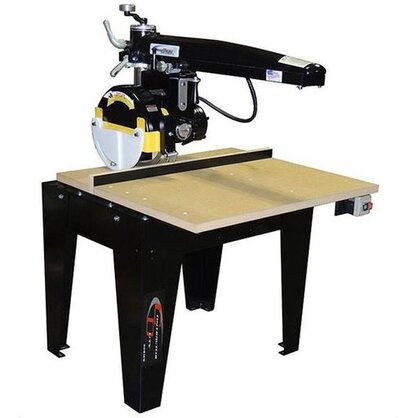 Available at Woodcraft Supply Available at Woodcraft Supply The history of the woodworking radial arm saw dates back to the late 1920s. The radial arm saw was invented by Raymond E. DeWalt, who also founded the DeWalt Products Company. He patented the saw in 1925, and it became commercially available around 1929. The radial arm saw was designed to be a versatile, all-in-one woodworking tool that could perform multiple tasks, such as crosscutting, ripping, mitering, and beveling. It was a game-changer for the woodworking industry, as it allowed for increased precision, productivity, and efficiency. A radial arm saw consists of a circular saw blade mounted on a horizontal arm that can be adjusted and pivoted to make different types of cuts. The saw's versatility comes from its ability to make various adjustments, allowing it to perform a wide range of woodworking tasks. Despite the introduction of more specialized tools like compound miter saws and table saws, the radial arm saw has remained a popular choice for many woodworkers due to its versatility and ease of use. When working with a radial arm saw, especially when processing reclaimed wood, it is essential to ensure that there are no hidden metal objects embedded within the material. These metal objects can damage the saw blade, cause kickback, and pose a safety risk to the operator. The Little Wizard and Lumber Wizard Woodworking Detectors are valuable tools for detecting buried metal in reclaimed wood, providing added safety and preventing potential damage to the saw blade. Retailers like Rockler, Woodcraft, Klingspor's, Infinity Tools, Lee Valley Tools, and many others sell the Wizard line of woodworking metal detectors to help woodworkers safely process reclaimed wood and protect their tools from hidden metal hazards. In summary, the history of the woodworking radial arm saw is marked by its versatility and ability to perform multiple woodworking tasks. The use of metal detectors like the Little Wizard and Lumber Wizard is essential when working with reclaimed wood to ensure safety and prevent blade damage from hidden metal objects. The number of teen and young adult woodworkers are growing in the DIY and woodworking markets.4/2/2023  The DIY and woodworking markets have been experiencing growth in recent years, and this trend extends to younger generations as well. The number of teenage woodworkers has been increasing, as more and more teens are discovering the joys and benefits of working with their hands and creating functional, beautiful items from wood. There are several factors contributing to the rising popularity of woodworking among teenagers:
Woodworking and guns have a long history of intersecting, dating back to the invention of firearms. From the stocks of early muskets to the intricate craftsmanship of modern rifles, woodworking has played a significant role in the development, functionality, and aesthetics of guns.
Some popular woods used for gunstocks include:
Immigrant woodworkers contribute to the diversity and richness of the woodworking community.4/2/2023 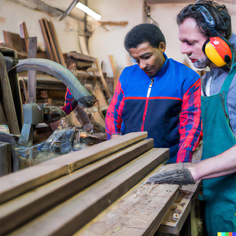 Immigrant woodworkers contribute to the diversity and richness of the woodworking community. They bring unique skills, techniques, and perspectives from their home countries, which can enrich the field and lead to innovation in woodworking practices. Immigrant woodworkers may come from a variety of cultural backgrounds and have different levels of expertise in woodworking. Some may have been professional woodworkers in their home countries, while others may have developed their skills as a hobby or as a way to preserve their cultural heritage. The presence of immigrant woodworkers in the woodworking community can:
Social media platforms, such as Instagram, Pinterest, and YouTube, as well as online forums and blogs, provide opportunities for immigrant woodworkers to connect with others, showcase their work, and learn from their peers. These platforms help create a supportive and inclusive environment where woodworkers of all backgrounds can thrive and contribute to the growth of the woodworking community.  While it is not common for politicians to be known for their woodworking skills, some politicians have shown an interest in the craft. Woodworking can serve as a creative outlet and a way to unwind from the stresses of political life. Here are a few examples of politicians who have engaged in woodworking:
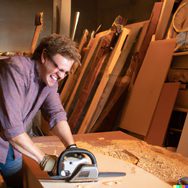 There are several celebrities, thespians and who have a passion for woodworking and have showcased their skills in the craft. Some of these celebrity woodworkers include:
The increase in time spent at home due to various factors, including the COVID-19 pandemic and remote work, has led many people to explore new hobbies and activities. Woodworking has emerged as a popular choice for those seeking a creative and engaging pastime. There are several reasons why woodworking has become an attractive option for individuals looking to convert their home offices or other spaces into hobby rooms:
Keeping your Little Wizard II Woodworking Metal Detector tuned and by using a brand new fully charged 9-volt battery the detection power and its sensing depth will be at their optimal stages providing the user with the best metal detection for wood and other non-metallic surfaces. Below are detailed instructions on how to fine-tune and use the Little Wizard II Woodworking Metal Detector. This information will be helpful for those looking to use this device effectively in their woodworking projects. To summarize the key points for fine-tuning and operating the Little Wizard II:
The Lumber Wizard 5 is a popular metal detector designed specifically for woodworking applications. It is an essential tool for detecting hidden metal objects like nails, screws, and staples in wood. The Lumber Wizard 5 features an automatic tuning function that processes each time the device is turned on. This feature helps to ensure accurate and reliable detection of metal objects in wood.
Using the Lumber Wizard 5 is easy and straightforward. Here are the steps to operate it:
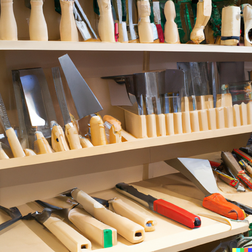 With the growing popularity of DIY (Do-It-Yourself) projects, woodworking tools retailers have experienced an increase in demand from both hobbyists and professionals. More people are taking an interest in woodworking, either as a creative outlet, a means to save money on furniture or home renovations, or simply as a way to develop a new skill set. As a result, woodworking tools retailers have become more popular among DIY enthusiasts. Some reasons for the increased popularity of woodworking tools retailers among DIY'ers include:
Reclaimed wood is becoming increasingly popular for woodworking projects due to its unique character, eco-friendliness, and historical significance. However, working with reclaimed wood can present some challenges, as it often contains hidden metal objects like nails, screws, or staples. These metal objects can damage cutting tools, saw blades, or other equipment, and pose a safety risk to the woodworker.
To safely work with reclaimed wood, it's essential to locate and remove any metal objects before cutting, sanding, or processing the material. Here are some tips to help you find nails and other metal objects in reclaimed wood:
 Woodturning is a specific type of woodworking that involves using a lathe to shape and form wood into a cylindrical shape. Woodturning is a popular technique for creating functional and decorative items such as bowls, plates, vases, and spindles. The process of woodturning involves securing a piece of wood to a lathe and rotating it at a high speed while using cutting tools to shape the wood. The cutting tools are held by the woodturner, who carefully guides them along the surface of the spinning wood, removing material and creating the desired shape. One of the advantages of woodturning is that it allows woodworkers to create precise and intricate shapes that would be difficult to achieve using other woodworking techniques. Woodturning also enables woodworkers to work with a variety of wood species, including exotic woods that are difficult to work with using other techniques. Woodturning requires skill and experience to achieve good results, and safety is paramount when working with a lathe. Woodturners must wear appropriate safety gear, such as eye protection and a face shield, and take precautions to avoid getting caught in the spinning wood or cutting tools. Overall, woodturning is a rewarding and challenging form of woodworking that allows woodworkers to create beautiful and unique pieces of art and functional items. With practice and experience, woodturners can achieve impressive results and enjoy the creative and technical aspects of this fascinating craft. |
ScribesWritten by ChatGPT with guidance from Billy Carmen. Past Blog Posts
June 2023
This website uses marketing and tracking technologies. Opting out of this will opt you out of all cookies, except for those needed to run the website. Note that some products may not work as well without tracking cookies. Opt Out of Cookies |

